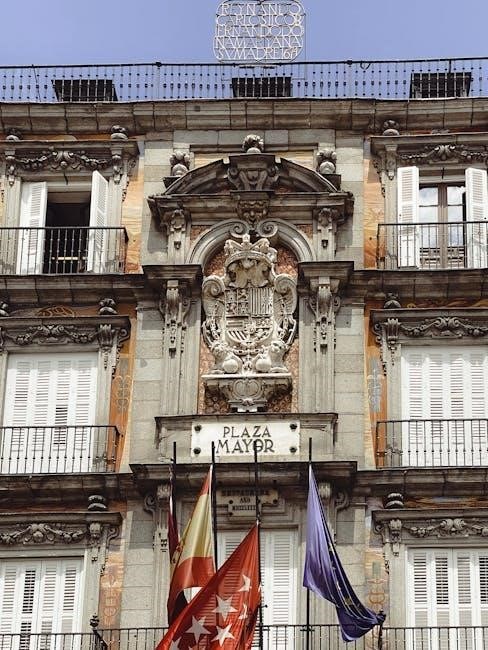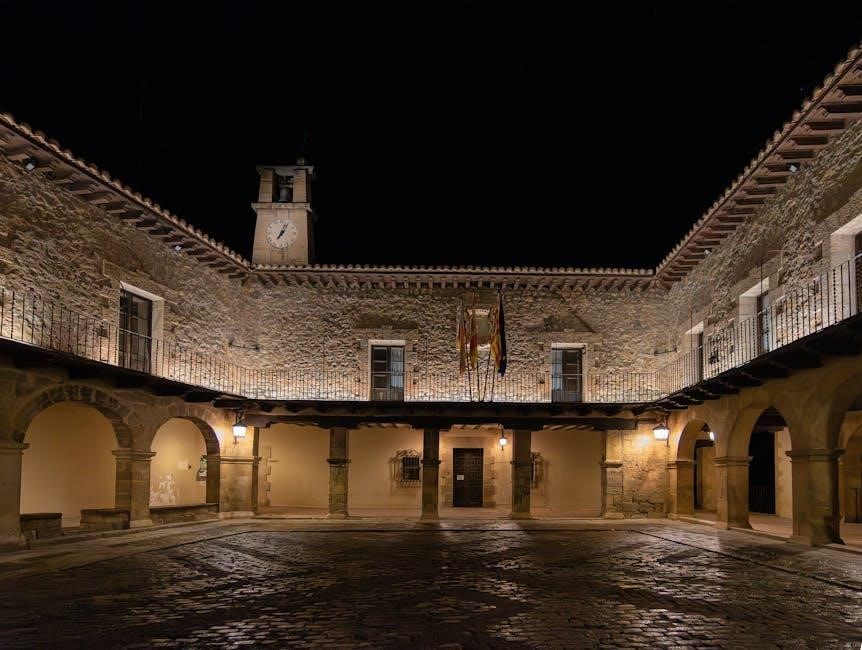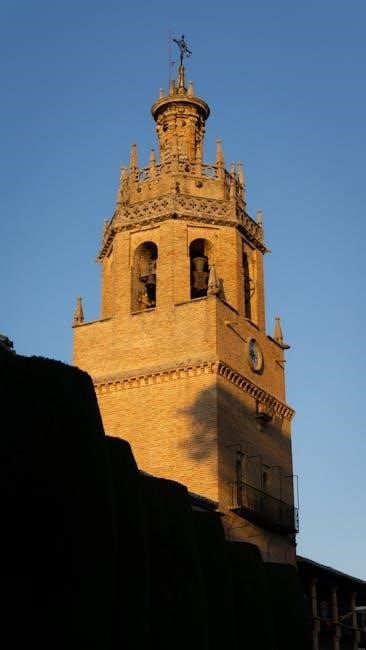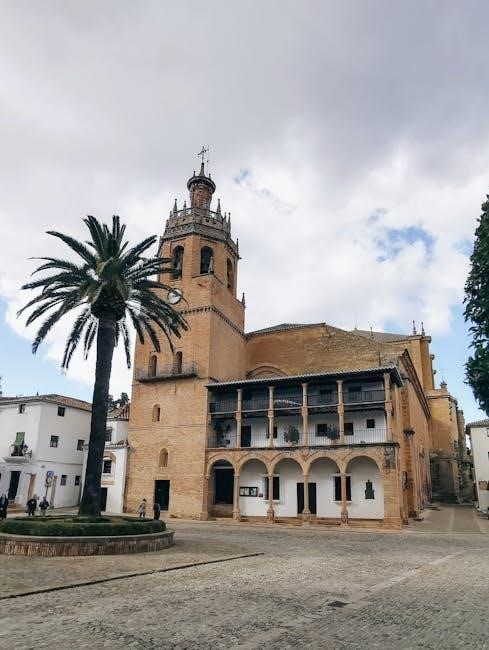The Mayor of Casterbridge is widely available in PDF, EPUB, and Kindle formats, offering readers convenient access to Thomas Hardy’s timeless tale of fate and redemption online.
1.1. Brief Overview of the Novel
The Mayor of Casterbridge by Thomas Hardy is a tragic tale of Michael Henchard, a man whose impulsive actions shape his destiny. After selling his wife and child in a drunken stupor, Henchard rises to become the respected Mayor of Casterbridge. However, his past returns to haunt him, leading to a devastating downfall. The novel explores themes of fate, guilt, and redemption, set against the backdrop of a rural English town. It is available in PDF, EPUB, and Kindle formats for free download.
1.2. Author Background: Thomas Hardy
Thomas Hardy, born in 1840 in Dorchester, England, was a renowned novelist and poet. Initially pursuing architecture, he later turned to writing, exploring themes of fate, class, and human struggle. His works, including Jude the Obscure and The Mayor of Casterbridge, are celebrated for their deep psychological insight and tragic realism. Hardy’s writing often reflected his pessimistic view of life, influenced by his rural upbringing and societal observations. His legacy endures as a major figure in English literature.
1.3. Historical Context of the Novel
The Mayor of Casterbridge is set in the 19th century, reflecting England’s transition from rural traditions to industrialization. Hardy’s portrayal of Casterbridge mirrors Dorchester, his hometown, blending historical accuracy with fictional narrative. The novel captures the social and economic shifts of the time, emphasizing the decline of rural life and the rise of urban influence. Hardy’s exploration of fate, class, and personal downfall is deeply rooted in the Victorian era’s societal norms and struggles, offering a timeless commentary on human resilience and moral complexity.

Plot Summary of “The Mayor of Casterbridge”
The novel revolves around Michael Henchard, a man who sells his wife and child in a drunken stupor, later rising to become Casterbridge’s mayor before facing ruin.
2.1. The Tragic Sale of Wife and Child
In a drunken rage at a fair, Michael Henchard auctions his wife, Susan, and their infant daughter, Elizabeth Jane, to a sailor for five guineas. This impulsive act, born of anger and alcohol, sets the foundation for the novel’s tragic events. The sale haunts Henchard, fueling his guilt and shaping his future. Years later, when Susan and Elizabeth Jane return, the consequences of his actions unfold, revealing the devastating impact of his momentary lapse in judgment.
2.2. Henchard’s Rise to Power
After abandoning his family, Michael Henchard settles in Casterbridge, where his sobriety and relentless work ethic lead to his rise as a prosperous grain merchant. His business acumen and strong will earn him respect, and he eventually becomes the Mayor of Casterbridge. Despite his outward success, Henchard’s past continues to haunt him, creating a stark contrast between his public achievements and private turmoil, setting the stage for his eventual downfall.
2.3. The Return of Susan and Elizabeth Jane
Years after her abandonment, Susan Henchard and her daughter Elizabeth Jane return to Casterbridge, seeking refuge after Susan’s husband is lost at sea. Their arrival reignites Henchard’s guilt and complicates his life, as he struggles to reconcile his past with his current position of power. Elizabeth Jane’s innocence and presence further unsettle Henchard, setting in motion a chain of events that will profoundly impact his relationships and future, revealing the enduring consequences of his earlier actions.
2.4. The Arrival of Richard Newson
The arrival of Richard Newson, Susan’s supposed husband, brings unexpected complications to Henchard’s life. Newson, believed dead after being lost at sea, returns to Casterbridge seeking his wife and daughter. His presence disrupts the fragile peace Henchard had attempted to rebuild with Susan and Elizabeth Jane. Newson’s arrival accelerates Henchard’s downward spiral, as he grapples with the consequences of his past actions and the unraveling of his carefully constructed life, highlighting the inescapability of fate and retribution.
2.5. The Fall of Michael Henchard
Michael Henchard’s downfall is a tragic culmination of his pride, impulsive nature, and past misdeeds. His rivalry with Donald Farfrae and the revelation of his earlier sale of Susan and Elizabeth Jane erode his reputation and power. Financial ruin follows as his business collapses, and his personal life disintegrates. Henchard’s inability to forgive himself and others ultimately leads to his isolation and death, marking the end of his tumultuous journey as a man of character, consumed by his own flaws and fate.

Major Themes in “The Mayor of Casterbridge”
The novel explores themes of fate, guilt, redemption, social class, love, and betrayal, delving into the human condition and societal constraints.
3.1. Fate and Destiny
The novel underscores the inevitability of fate, as Michael Henchard’s life is shaped by his impulsive decisions and unrelenting circumstances; His tragic flaw of hubris leads to a downward spiral, illustrating Hardy’s belief in the powerlessness of individuals against destiny. Henchard’s fall from mayor to outcast symbolizes the futility of resisting fate, while the return of his family and the rise of Farfrae emphasize the unstoppable forces of destiny that govern human lives.
3.2. Guilt and Redemption
Michael Henchard’s journey is marked by profound guilt, stemming from his drunken sale of his wife and child. His later attempts to redeem himself, though noble, are overshadowed by the irreversible consequences of his past actions. The novel explores the idea that guilt can both destroy and motivate, as Henchard’s remorse drives his ambition yet ultimately leads to his downfall. Redemption remains elusive, leaving his story a poignant reflection on moral accountability and the enduring weight of regret.
3.3. Social Class and Status
Thomas Hardy’s The Mayor of Casterbridge explores the rigid social hierarchies of 19th-century England, where class and status heavily influenced opportunities and relationships. Michael Henchard’s rise to mayor symbolizes upward mobility, yet his past and pride alienate him from higher society. The novel critiques the social conventions that trap individuals in their allotted roles, as seen in Henchard’s strained interactions with wealthier figures like Donald Farfrae. Class divisions underscore the tension between tradition and progress, reflecting Hardy’s keen observation of Victorian society.
3.4. Love and Betrayal
Love and betrayal are central to The Mayor of Casterbridge, as Henchard’s impulsive sale of his wife and child initiates a chain of tragic events. His later relationships, particularly with Lucetta, are marked by pride and deceit, leading to emotional turmoil. The novel examines how betrayal, driven by flawed human nature, disrupts personal connections and perpetuates suffering, ultimately highlighting the destructive power of unchecked emotions and the enduring consequences of past mistakes.

Character Analysis
The novel delves into the complex characters of Michael Henchard, Susan, Elizabeth Jane, Donald Farfrae, and Lucetta, exploring their motivations, flaws, and transformations, shaping the tragic narrative.
4.1. Michael Henchard: The Flawed Hero
Michael Henchard, the protagonist, is a tragic figure whose impulsive actions and rigid pride lead to his downfall. His rise from a poor laborer to the Mayor of Casterbridge showcases his resilience and work ethic. However, his flaws, such as his drunken sale of his wife and child, define his tragic trajectory. Henchard’s inability to forgive and his stubbornness alienate him, making him both a powerful and sympathetic character. His story explores the destructive power of pride and the inevitability of fate.
4.2. Susan Henchard: The Tragic Figure
Susan Henchard is a tragic figure whose life is marked by suffering and silent endurance. Her husband’s impulsive sale of her and their child sets off a chain of misfortunes. Returning to Casterbridge years later, she seeks reconciliation, but her presence disrupts Henchard’s life. Susan’s weak constitution and tragic death further deepen the novel’s somber tone, making her a poignant victim of circumstance and a symbol of the devastating consequences of Henchard’s actions.
4.3. Elizabeth Jane: The Innocent Victim
Elizabeth Jane, the daughter of Michael and Susan Henchard, is an innocent victim of her father’s tragic flaws. Her return to Casterbridge with her mother sets off a chain of events that disrupts Henchard’s life. Elizabeth Jane’s quiet strength and resilience contrast with the turmoil around her, making her a symbol of innocence caught in the crossfire of her family’s destiny. Her story highlights the profound impact of Henchard’s choices on those he loves.
4.4. Donald Farfrae: The Rival
Donald Farfrae, a shrewd and ambitious Scottish merchant, becomes Henchard’s rival in both business and personal life. His arrival in Casterbridge disrupts Henchard’s dominance, leading to a complex dynamic of competition and mutual respect. Farfrae’s charm, intelligence, and entrepreneurial spirit contrast with Henchard’s rigid nature, making him a formidable opponent. Their rivalry extends beyond commerce, influencing the lives of those around them, particularly Elizabeth Jane and Lucetta, and ultimately contributing to Henchard’s downfall.
4.5. Lucetta Templeman: The Enigmatic Character
Lucetta Templeman, a refined and mysterious figure, enters Casterbridge with a hidden past tied to Henchard. Her elegance and charm captivate the town, but her secrets fuel intrigue. As a rival to Elizabeth Jane for Henchard’s affections, Lucetta’s arrival sparks tension. Her relationship with Farfrae further complicates the dynamics, leading to tragic consequences. Lucetta’s enigmatic nature and untimely death underscore her role as both a victim of circumstance and a catalyst for the novel’s dramatic unraveling.
Symbolism in the Novel
The novel is rich in symbolism, with the fair representing chance and misfortune, while Casterbridge itself symbolizes societal constraints and moral judgment.
5.1. The Fair: A Symbol of Chance and Misfortune
The fair in The Mayor of Casterbridge symbolizes the unpredictability of life, where chance encounters and hasty decisions shape destinies. It is here that Michael Henchard’s drunken impulsive sale of his wife and child occurs, setting off a chain of tragic events. The fair’s lively yet transient nature mirrors the instability of human fortunes, highlighting how fleeting moments of poor judgment can lead to enduring misfortune. This scene underscores Hardy’s exploration of fate and the irreversible consequences of human actions.
5.2. Casterbridge: The Setting as a Character
Casterbridge, the fictional town in Hardy’s novel, serves as a vivid character in its own right. Its ancient, narrow streets and rustic charm evoke a sense of timelessness, while its isolation mirrors the rigid social structures of 19th-century rural England. The town’s architecture and layout reflect the moral and emotional states of its inhabitants, particularly Henchard, whose rise and fall are deeply intertwined with the town’s identity. Casterbridge becomes a silent witness to the characters’ struggles, embodying the enduring yet unyielding nature of tradition and fate.
5.3. The Mayor’s Chain: Symbol of Power and Pride
The Mayor’s chain in “The Mayor of Casterbridge” symbolizes Michael Henchard’s authority and pride as the town’s leader. It represents his hard-earned status and respectability, contrasting with his humble beginnings; The chain also serves as a reminder of his past mistakes and the fragility of his reputation. Its presence underscores Henchard’s internal struggle between his public image and private turmoil, making it a poignant symbol of ambition and the fleeting nature of power in Hardy’s exploration of human fallibility.
Critical Analysis and Reception
The Mayor of Casterbridge is acclaimed for its profound exploration of fate and redemption, showcasing Hardy’s mastery of tragic narrative, now accessible in PDF for study.
6.1. Contemporary Reviews of the Novel
Contemporary reviews of The Mayor of Casterbridge often praised its deep exploration of human nature and tragic elements. Critics noted Hardy’s vivid portrayal of Michael Henchard’s flawed character and the novel’s bleak yet thought-provoking themes. The story’s emotional depth and Hardy’s masterful storytelling were widely acclaimed. Many reviewers highlighted its critique of societal norms and the enduring relevance of its themes. The novel’s availability in PDF formats has made it accessible to modern readers, ensuring its continued impact on English literature.
6.2. Modern Interpretations of the Text
Modern interpretations of The Mayor of Casterbridge highlight its timeless themes of fate, class, and personal responsibility. Readers appreciate the novel’s psychological depth, particularly in Henchard’s complex character. The story’s exploration of guilt and redemption resonates deeply, while its critique of social hierarchy remains relevant. Digital formats like PDF have made the novel more accessible, allowing contemporary audiences to engage with Hardy’s profound insights into human nature and societal structures.
6.3. The Novel’s Place in Hardy’s Oeuvre
The Mayor of Casterbridge stands as a pivotal work in Thomas Hardy’s literary career, showcasing his mastery of tragic narratives and social commentary; It is often regarded alongside Tess of the d’Urbervilles and Jude the Obscure as a cornerstone of his oeuvre. The novel’s exploration of fate, guilt, and redemption aligns with Hardy’s broader themes of human struggle against societal and cosmic forces. Its enduring popularity, enhanced by accessibility in PDF and other digital formats, underscores its significance in Hardy’s body of work.

Adaptations and Interpretations
The Mayor of Casterbridge has inspired numerous adaptations, including film, television, and stage productions, while its themes and characters continue to influence literary and cultural works globally.
7.1. Film and Television Adaptations
The Mayor of Casterbridge has been adapted into several film and television productions, including a notable 2003 TV movie directed by David Thacker. This three-hour adaptation brings Thomas Hardy’s tragic tale to life, capturing the complexities of Michael Henchard’s character and the Victorian setting. Other adaptations have also emerged, showcasing the novel’s enduring appeal. These interpretations offer fresh perspectives on the story, making it accessible to modern audiences while staying true to Hardy’s original vision.
7.2. Stage Productions and Plays
The Mayor of Casterbridge has inspired numerous stage adaptations, including a musical theater production by David Willinger and Christopher Beste. These adaptations bring Hardy’s tragic narrative to life, emphasizing themes of fate, guilt, and redemption. Theatrical interpretations often focus on Henchard’s emotional journey, using dramatic dialogue and stage design to evoke the novel’s Victorian setting. Such productions highlight the timeless appeal of Hardy’s work, offering audiences a vivid exploration of human complexity and societal dynamics through live performance.
7.3. The Novel’s Influence on Other Works
The Mayor of Casterbridge has profoundly influenced literature and arts, inspiring adaptations like a musical theater production. Its exploration of fate and human struggle resonates in contemporary works, shaping themes in drama and fiction. Hardy’s vivid portrayal of Casterbridge has also inspired visual and performative interpretations, cementing its legacy as a foundational text in English literature, while its themes continue to evoke new creative responses across various mediums and genres.
Downloads and Availability
The Mayor of Casterbridge is widely available for free download in PDF, EPUB, and Kindle formats from platforms like Litres, Project Gutenberg, and Internet Archive, ensuring easy access for readers worldwide.
8.1. Free PDF Downloads of the Novel
The Mayor of Casterbridge is readily available as a free PDF download from various online platforms, including Project Gutenberg, Litres, and Internet Archive. These platforms offer complete and unabridged versions of the novel, ensuring readers can access Thomas Hardy’s masterpiece without cost. The PDF format preserves the original text’s integrity, making it ideal for academic or personal reading. Users can easily download the file and enjoy the novel on their preferred devices, contributing to its enduring accessibility and popularity worldwide.
8.2. eBook Formats: EPUB, Kindle, and More
The Mayor of Casterbridge is available in various eBook formats, including EPUB, Kindle, and plain text, ensuring compatibility with multiple devices. Platforms like Litres, Project Gutenberg, and the Kindle Store offer these formats for free or at minimal cost. Readers can enjoy adjustable fonts, bookmarks, and easy navigation, enhancing their reading experience. These digital versions preserve the novel’s original charm while adapting to modern reading preferences, making Hardy’s classic accessible to a broader audience worldwide.
8.3. Audiobook Versions of the Novel
The Mayor of Casterbridge is also accessible in audiobook formats, available on platforms like Audible, Google Play Books, and more. Narrators bring Michael Henchard’s tragic journey to life with captivating storytelling. Audiobooks offer a convenient way to experience Hardy’s masterpiece, allowing listeners to absorb the tale of fate, guilt, and redemption on the go. This format is ideal for those who prefer immersive storytelling or have busy schedules, ensuring the novel’s timeless themes reach a wider audience.
Study Guides and Resources
Study guides for The Mayor of Casterbridge include summaries, analysis, and essay topics, while resources like LitRes offer free PDF downloads and historical context for deeper understanding.
9.1. Summary and Analysis for Students
Students can access detailed summaries and analyses of The Mayor of Casterbridge in PDF formats, providing insights into the novel’s plot, characters, and themes. These resources often include chapter-by-chapter breakdowns, character motivations, and critical essays, helping students grasp Hardy’s exploration of fate, guilt, and redemption. Many guides also highlight symbolic elements, such as the fair and Casterbridge itself, offering a deeper understanding of the novel’s complexities. These materials are invaluable for academic study and essay preparation, ensuring a comprehensive grasp of Hardy’s masterpiece.
9.2. Essay Topics and Discussion Questions
PDF resources offer a wealth of essay topics and discussion questions on The Mayor of Casterbridge, encouraging deep analysis of its themes, characters, and literary devices. Topics might include exploring Henchard’s tragic flaws, the role of fate, or the impact of social class. Questions could focus on Henchard’s redemption arc, the symbolism of Casterbridge, or the novel’s commentary on Victorian society. These tools are essential for fostering critical thinking and engaging discussions among students and scholars alike.
9.3. Historical and Literary Context Resources
PDF editions of The Mayor of Casterbridge often include supplementary materials that provide historical and literary context, enriching readers’ understanding of Hardy’s work. These resources explore the novel’s Victorian setting, its reflection of 19th-century social issues, and Hardy’s influences. They also delve into the cultural significance of Casterbridge as a fictional town modeled after Dorchester, offering insights into the novel’s timeless themes and its place within English literature.

The Novel’s Legacy
The Mayor of Casterbridge remains a cornerstone of English literature, its exploration of fate, guilt, and social class continuing to resonate with readers and scholars alike.
10.1. Impact on English Literature
The Mayor of Casterbridge has left an indelible mark on English literature, solidifying Thomas Hardy’s reputation as a master of tragic fiction. Its profound exploration of fate, guilt, and societal structures has influenced countless authors and remains a cornerstone of Victorian-era novels. The book’s complex characters and moral dilemmas continue to inspire literary analysis, ensuring its enduring relevance in academic and cultural discourse. Its themes resonate universally, making it a timeless classic in the canon of English literature.
10.2. Cultural Significance of the Story
The Mayor of Casterbridge holds profound cultural significance as a reflection of Victorian society’s moral and social structures. Its exploration of fate, class, and personal responsibility resonates deeply, offering insights into the human condition. The novel’s regional setting and Hardy’s vivid portrayal of rural life have preserved a cultural snapshot of 19th-century England. Its themes and characters continue to influence literature, film, and theater, ensuring its relevance across generations and solidifying its place in cultural heritage.
10.3. The Novel’s Timeless Themes
The Mayor of Casterbridge explores enduring themes of fate, guilt, and redemption, resonating across generations. Hardy’s examination of human frailty, societal class, and love underscores universal struggles. The novel’s focus on personal responsibility and the inevitability of consequences remains deeply relevant, making it a timeless commentary on the human condition and societal norms. Its exploration of moral complexity continues to captivate readers, ensuring its enduring appeal in modern literature and culture.
The Mayor of Casterbridge remains a profound exploration of human nature and fate. Available in PDF, the novel’s themes of guilt and redemption continue to resonate universally, ensuring its lasting impact.
11.1. Final Thoughts on the Novel’s Significance
The Mayor of Casterbridge is a masterpiece of tragic literature, exploring themes of fate, guilt, and redemption. Michael Henchard’s story, available in PDF, underscores the enduring power of Hardy’s prose. The novel’s profound examination of human flaws and societal constraints continues to captivate readers. Its timeless themes ensure its relevance, making it a must-read in both physical and digital formats like PDF, EPUB, and Kindle, preserving its legacy for future generations to appreciate and reflect upon.
11.2. Recommendations for Further Reading
For deeper exploration, readers can download The Mayor of Casterbridge in PDF or eBook formats from platforms like Litres, which offers free and paid options. Additionally, Thomas Hardy’s other works, such as Jude the Obscure and Tess of the d’Urbervilles, provide complementary insights into his exploration of human struggle and societal issues. These resources are readily available in various digital formats, ensuring accessibility for modern readers seeking to engage with Hardy’s profound literary legacy.
11.3. The Enduring Appeal of “The Mayor of Casterbridge”
The novel’s timeless themes of fate, guilt, and redemption continue to captivate readers. Michael Henchard’s tragic journey remains a powerful exploration of human frailty and ambition. The availability of The Mayor of Casterbridge in PDF and other digital formats ensures its accessibility to modern audiences. Hardy’s vivid portrayal of Victorian life and the emotional depth of his characters keep the story relevant, making it a lasting classic in English literature.


